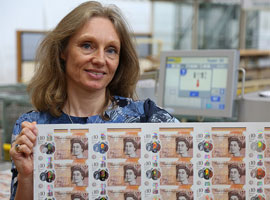At this week’s Future of Cash Conference, the Bank of England’s Chief Cashier Victoria Cleland gave a speech regarding the future of cash and the factors affecting banknote demand.
 Victoria Cleland gave the speech yesterday at the conference, being held in Vienna.
Victoria Cleland gave the speech yesterday at the conference, being held in Vienna.
Cleland recognises that there are many alternatives to cash that are increasingly being used by people. However, even with these payment alternatives, she stated that cash remains the most widely used payment method in the UK. In 2016, the value of Bank of England banknotes in circulation increased by 10%, reaching over £70 billion in the run-up to Christmas. This, says the Bank, is the fastest growth seen in a decade. In 2016, cash accounted for 40% of all payments – 44% of all payments made by consumers.
Speaking of predicting cash demand, Cleland said that central banks must understand why people are using cash – understanding the drivers of demand and, crucially, how they may change, is important for central banks.
Victoria Cleland summarised by stating:
“Cash continues to play a key role for many, and a crucial role for some. It is important that we, as a central bank, and the wider cash industry continue to fulfil our responsibilities to ensure that genuine, good quality notes are available to meet public demand. Flexibility is important, as is efficiency, competition and business continuity. These factors are drivers that led to the Bank’s announcement today that, following a competitive tender, the Bank has entered into 10 year contracts with both CCL Secure Limited and De La Rue to supply the polymer substrate for the next £20 banknote. The new Turner £20 note will be issued in 2020, and I look forward to working with the cash industry again to deliver this change: the next new chapter for cash.“
The speech is available to read in its entirety from the Bank of England website. Click here to view.






